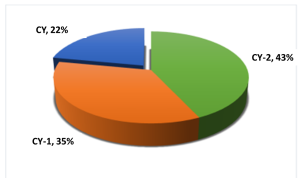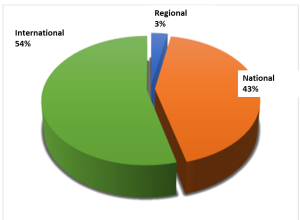Teaching Staff Profile
The recruitment of teaching staff of BAB is based on the Law of the Republic of Indonesia Number 14 of 2005 on Teachers and Lecturers and the Regulation of Government of the Republic of Indonesia Number 37 of 2009. The terms and recruitment process are explained in these regulations.
There are 29 lecturers at the BAB consisting of professor (7%), associate professor (31% ), assistant professor (48%); and lecturer (14%). It means that most of the lecturers in the agribusiness study programme rank as associate professors and assistant professors. Based on their education level, 62% of lecturers graduated from doctoral degree level, 31% graduated from magister degree, and 7% of them are currently pursuing the doctoral degrees.

The professional qualification of academic staff is formally acknowledged in a teaching certification called ‘Certification of Lecturers’, and currently the rate of certified academic staff is 86.21%. The lecturers and students ratio in BAB is close to ideal (1:27) and is continuously maintained to improve the quality of education and teaching. Based on the Decree of the Minister of National Education of the Republic of Indonesia Number 234 of 2000 on the Guidelines for the Establishment of Higher Education, the ideal ratio of lecturers to students is 1:30.
The lecturers of BAB study programme, both individually and institutionally, are involved in various collaborative activities with many institutions, such as local and central government and the private sector as experts. Regarding this collaboration, the Head of the Department always provides direct and indirect support including permits, monitoring, and facilities. Furthermore, many BAB lecturers are involved in public leadership at the local and regional levels, such as a chairman of the IPB University graduates association, the head of neighbourhood community (henceforth RT –Rukun Tetangga), and BAZNAS (an official institution established by the Indonesian Government which has the responsibility and functions to manage zakat funds and other Islamic religious charity (ZIS)). It is important in order to achieve the vision and missions by cooperating with all stakeholders outside the campus.
The research of BAB lecturers becomes important references in Agribusiness studies. Research conducted by BAB staff has always been improved in novelty which also impacts the study development related to Agribusiness. The publications of this research are also expected to be an important output to improve the existence of BAB lecturers of FP Unib in terms of ensuring the research quality in the field of Agribusiness studies. The number of citations of scientific papers published by BAB staff for the last 3 years are 160 citations (the details shown in Figure 12). The citation of the publications aims not only to provide an important meaning in the development of studies related to agribusiness but also to encourage the improvement of the research quality in the field of agribusiness conducted by BAB lecturers.

There are 65 recognitions of expertise, achievement, and performance of the Permanent Lecturers of the Study Programme (henceforth DTPS –Dosen Tetap Program Studi) in 2018-2020 at the level of international (54%), national (43% ), and regional (3%).

In 2020, there were 79 research titles conducted by lecturers of BAB. Based on the funding sources, 42 research which are self-funded or funded by the university, 36 titles funded by institutions outside the university, and 1 title funded by an international institution. Generally, the topics of research are in line with the main focus of research of Unib and relevant to the vision, missions, and objectives of the study programme. Meanwhile, there were 52 community service activities conducted by the lecturers funded by the university and independent funds, 25 activities funded by the institutions outside of the university, and 2 activities funded by the international institutions. The community service activities conducted by BAB lecturers are in the form of the socialisation activities and community group development. Furthermore, several lecturers created innovative learning activities, such as Entrepreneurship Course uses YouTube channels to publish and promote BAB students’ entrepreneurial products and to encourage students to apply e-commerce and promote their products digitally.
The lecturers are responsible for reporting their workload (henceforth BKD –Beban Kerja Dosen) including teaching, research, and community service which are called three higher education pillars called the Tri Dharma of Higher Education. The workload, divided by staff qualification level, should be between 12 and 16 credit points each semester based on the Decree of the Director General of Higher Education Ministry of Education and Culture Number 12/E/KPT/2021. Through the performance evaluation based on the BKD report on the Integrated Resource Information System (henceforth SISTER –Sistem Informasi Sumberdaya Terintegrasi) application (https://sister.unib.ac.id), the lecturers understand their duty in fulfilling the Tri Dharma of Higher Education. In the research category, for instance, lecturers are expected to increase the publication in the national and international journals or activities funded by the faculty, university, and national competitive resources. Thus, these activities will improve the institution performance.